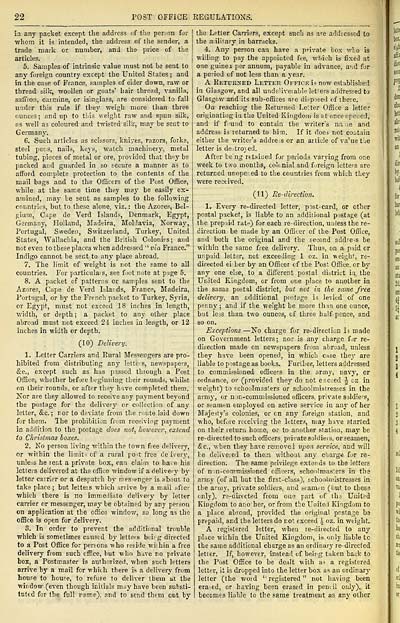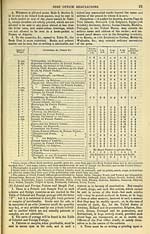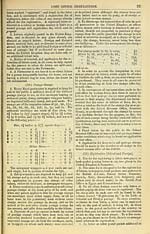Download files
Complete book:
Individual page:
Thumbnail gallery: Grid view | List view

22
POST OFFICE REGULATIONS.
in any packet except the address of the person for
whom it is intended, the address of the sender, a
trade mark or number, and the price of the
articles.
5. Samples of intrinsic value must not be sent to
any foreign country except the United States ; and
in the case of France, samples of eider down, raw or
thread silk, woollen or goats' hair thread, vanilla,
saffron, carmine, or isinglass, are considered to fall
under this rule if they weigh more than three
ounces; and up to this weight, raw and spun silk,
;is well as coloured and twisted silk-, may be sent to
Germany.
6. Such articles as scissors, knives, razors, forks,
steel pens, nails, keys, watch machinery, metal
tubing, pieces of metal or ore, provided that they be
packed and guarded in so secure a manner as to
afford complete protection to the contents of the
mail bags and to the Officers of the Post Office,
while at the same time they may be easily ex-
amined, may be sent as samples to the following
countries, but to these alone, viz. : the Azores, Bel-
gium, Cape de Verd Islands, Denmark, Egypt,
Germany, Holland, Madeira, Moldavia, Norway,
Portugal, Sweden, Switzerland, Turkey, United
States, Wallachia, and the British Colonies ; and
not even to these places when addressed " via France."
Indigo cannot be sent to any place abroad.
7. The limit of weight is not the same to all
countries. For particulais, see foot note at page 5.
8. A packet of patterns or samples sent to the
Azores, Cape de Verd Islands, France, Madeira,
Portugal, or by the French packet to Turkey, Syria,
or Egypt, must not exceed 18 inches in length,
width, or depth ; a packet to any other place
abroad must not exceed 2-1 inches in length, or 12
inches in width or depth.
(10) Delivery.
1. Letter Carriers and Rural Messengers are pro-
hibited from distributing anj' letters, newspapers,
&c, except such as has passed through a Post
Office, whether before beginning their rounds, whilst
on their rounds, or after they have completed them.
Nor are they allowed to receive any payment beyond
the postage for the delivery or collection of any
letter, &c. ; r.or to deviate from the route laid down
for them. The prohibition from receiving payment
in addition to the postage does not, however, extend
io Christmas boxes.
2. No person living within the town fee delivery,
or within the limits of a rural po^t free de ivery,
unless he rent a private box, can claim to have his
letters delivered at the office window if a delivery by-
letter carrier or a despatch by mes-enger is about to
take place; but letteis which arrive by a mail after
which there is no immediate delivery by letter
carrier or messenger, may be obtained by any person
on application at the office window, so long as the
office is open for delivery.
S. In order to prevent the additional trouble
which is sometimes caused by letters ben g directed
to a Post Office for persons who reside within a free
delivery from such office, but who hare no private
box, a Postmaster is authorized, when such letters
arrive by a mail for which there is a delivery from
house to house, to refuEe to deliver them at the
window (even though initials may have been substi-
tuted for the full rame), and to send them out by
the Letter Carriers, except such as are addicssed to
the military in barracks.
4. Any person can have a private box who is
willing to pay the appointed fee, which is fixed at
one guinea per annum, payable in advance, a>,d for
a period of not less than a year.
A Returned Letter Office is now established
in Glasgow, and all undeliveiable letters addreseed to
Glasgow' and its sub-offices are disposed of there.
On reaching the Returned tetter Office a letter
originating in the United Kingdom is at once opened,
and if found to contain the writer's na de and
address U returned to him. If it does not contain
either the writer's address or an article of va T ue the
letter is de?troved.
After be'ng retained for periods varying from one
week to tivo months, colonial and foreign letters are
returned unoper.ed to the countiies from which they
were received.
(11) Re-direction.
1. Every re-direcled letter, post-card, or other
postal packet, is liable to an additional postage (at
the prepaid rat>-) for each re- direction, unless the re-
direction be made by an Officer of the Post Office,
and both the original and the second address be
within the same free delivery. Thus, on a paid or
unpaid letter, not exceeding 1 oz. in weight, re-
directed either by an Officer of the Post Office, or by
any one else, to a different postal district ia the
United Kingdom, or from one place to another in
the same postal district, but not in, the same free
delivery, an additional postage is levied of one
penny ; and if the weight be more than one ounce,
but less than two ounces, cf three halfpence, and
so on.
Exceptions — No charge for re-direction U made
on Government letters; nor is any charge for re-
direction made on newspapers from abroad, unless
tbey have been opened, in which case they are
liable to postage as books. Further, letters addressed
to commissioned officers in the army, navy, or
ordnance, or (provided they do not exceed \ oz in
weight) to schoolmasters or schoolmistresses in the
army, or njn-commissioned officers, private soldie-s,
or seamen employed on active service in any of her
Majesty's colonies, or en any foreign station, and
who, before receiving the letters*, may have started
on their return home, or to another station, may be
re-directed to such officers, private soldiers, or seamen,
&c, when they have removed upon service, and will
be delivered to thern without any charge for re-
direction. The same privilege extends to the letters
of nvn-commissioned officers, schoolmas'.ers in the
army (of all but the first-class), schoolmistresses in
the army, private soldiers, and seamen (but to thess
only), r-3-directed from one part of ths United
Kingdom to an o her, or from the Unite! Kingdom to
a place abroad, provided the original postage ba
prepaid, and the letters do cot exceed 4 oz. in weight.
A registered letter, when re-directed to any
place within the United Kingdom, is only liable tc
the same additional charge as an ordinary re- directed
letter. If, however, instead of being taken back to
the Post Office to be dealt with as a registered
letter, it is dropped into the letter box as an ordinary
letter (the word "registered" not having been
era-.ed, or having been erased in pencil only), it
becomes liable to the same treatment as any other
POST OFFICE REGULATIONS.
in any packet except the address of the person for
whom it is intended, the address of the sender, a
trade mark or number, and the price of the
articles.
5. Samples of intrinsic value must not be sent to
any foreign country except the United States ; and
in the case of France, samples of eider down, raw or
thread silk, woollen or goats' hair thread, vanilla,
saffron, carmine, or isinglass, are considered to fall
under this rule if they weigh more than three
ounces; and up to this weight, raw and spun silk,
;is well as coloured and twisted silk-, may be sent to
Germany.
6. Such articles as scissors, knives, razors, forks,
steel pens, nails, keys, watch machinery, metal
tubing, pieces of metal or ore, provided that they be
packed and guarded in so secure a manner as to
afford complete protection to the contents of the
mail bags and to the Officers of the Post Office,
while at the same time they may be easily ex-
amined, may be sent as samples to the following
countries, but to these alone, viz. : the Azores, Bel-
gium, Cape de Verd Islands, Denmark, Egypt,
Germany, Holland, Madeira, Moldavia, Norway,
Portugal, Sweden, Switzerland, Turkey, United
States, Wallachia, and the British Colonies ; and
not even to these places when addressed " via France."
Indigo cannot be sent to any place abroad.
7. The limit of weight is not the same to all
countries. For particulais, see foot note at page 5.
8. A packet of patterns or samples sent to the
Azores, Cape de Verd Islands, France, Madeira,
Portugal, or by the French packet to Turkey, Syria,
or Egypt, must not exceed 18 inches in length,
width, or depth ; a packet to any other place
abroad must not exceed 2-1 inches in length, or 12
inches in width or depth.
(10) Delivery.
1. Letter Carriers and Rural Messengers are pro-
hibited from distributing anj' letters, newspapers,
&c, except such as has passed through a Post
Office, whether before beginning their rounds, whilst
on their rounds, or after they have completed them.
Nor are they allowed to receive any payment beyond
the postage for the delivery or collection of any
letter, &c. ; r.or to deviate from the route laid down
for them. The prohibition from receiving payment
in addition to the postage does not, however, extend
io Christmas boxes.
2. No person living within the town fee delivery,
or within the limits of a rural po^t free de ivery,
unless he rent a private box, can claim to have his
letters delivered at the office window if a delivery by-
letter carrier or a despatch by mes-enger is about to
take place; but letteis which arrive by a mail after
which there is no immediate delivery by letter
carrier or messenger, may be obtained by any person
on application at the office window, so long as the
office is open for delivery.
S. In order to prevent the additional trouble
which is sometimes caused by letters ben g directed
to a Post Office for persons who reside within a free
delivery from such office, but who hare no private
box, a Postmaster is authorized, when such letters
arrive by a mail for which there is a delivery from
house to house, to refuEe to deliver them at the
window (even though initials may have been substi-
tuted for the full rame), and to send them out by
the Letter Carriers, except such as are addicssed to
the military in barracks.
4. Any person can have a private box who is
willing to pay the appointed fee, which is fixed at
one guinea per annum, payable in advance, a>,d for
a period of not less than a year.
A Returned Letter Office is now established
in Glasgow, and all undeliveiable letters addreseed to
Glasgow' and its sub-offices are disposed of there.
On reaching the Returned tetter Office a letter
originating in the United Kingdom is at once opened,
and if found to contain the writer's na de and
address U returned to him. If it does not contain
either the writer's address or an article of va T ue the
letter is de?troved.
After be'ng retained for periods varying from one
week to tivo months, colonial and foreign letters are
returned unoper.ed to the countiies from which they
were received.
(11) Re-direction.
1. Every re-direcled letter, post-card, or other
postal packet, is liable to an additional postage (at
the prepaid rat>-) for each re- direction, unless the re-
direction be made by an Officer of the Post Office,
and both the original and the second address be
within the same free delivery. Thus, on a paid or
unpaid letter, not exceeding 1 oz. in weight, re-
directed either by an Officer of the Post Office, or by
any one else, to a different postal district ia the
United Kingdom, or from one place to another in
the same postal district, but not in, the same free
delivery, an additional postage is levied of one
penny ; and if the weight be more than one ounce,
but less than two ounces, cf three halfpence, and
so on.
Exceptions — No charge for re-direction U made
on Government letters; nor is any charge for re-
direction made on newspapers from abroad, unless
tbey have been opened, in which case they are
liable to postage as books. Further, letters addressed
to commissioned officers in the army, navy, or
ordnance, or (provided they do not exceed \ oz in
weight) to schoolmasters or schoolmistresses in the
army, or njn-commissioned officers, private soldie-s,
or seamen employed on active service in any of her
Majesty's colonies, or en any foreign station, and
who, before receiving the letters*, may have started
on their return home, or to another station, may be
re-directed to such officers, private soldiers, or seamen,
&c, when they have removed upon service, and will
be delivered to thern without any charge for re-
direction. The same privilege extends to the letters
of nvn-commissioned officers, schoolmas'.ers in the
army (of all but the first-class), schoolmistresses in
the army, private soldiers, and seamen (but to thess
only), r-3-directed from one part of ths United
Kingdom to an o her, or from the Unite! Kingdom to
a place abroad, provided the original postage ba
prepaid, and the letters do cot exceed 4 oz. in weight.
A registered letter, when re-directed to any
place within the United Kingdom, is only liable tc
the same additional charge as an ordinary re- directed
letter. If, however, instead of being taken back to
the Post Office to be dealt with as a registered
letter, it is dropped into the letter box as an ordinary
letter (the word "registered" not having been
era-.ed, or having been erased in pencil only), it
becomes liable to the same treatment as any other
Set display mode to: Large image | Transcription
Images and transcriptions on this page, including medium image downloads, may be used under the Creative Commons Attribution 4.0 International Licence unless otherwise stated. ![]()
| Scottish Post Office Directories > Towns > Glasgow > Post-Office annual Glasgow directory > 1875-1876 > (918) |
|---|
| Permanent URL | https://digital.nls.uk/84185769 |
|---|
| Description | Directories of individual Scottish towns and their suburbs. |
|---|
| Description | Around 700 Scottish directories published annually by the Post Office or private publishers between 1773 and 1911. Most of Scotland covered, with a focus on Edinburgh, Glasgow, Dundee and Aberdeen. Most volumes include a general directory (A-Z by surname), street directory (A-Z by street) and trade directory (A-Z by trade). |
|---|


